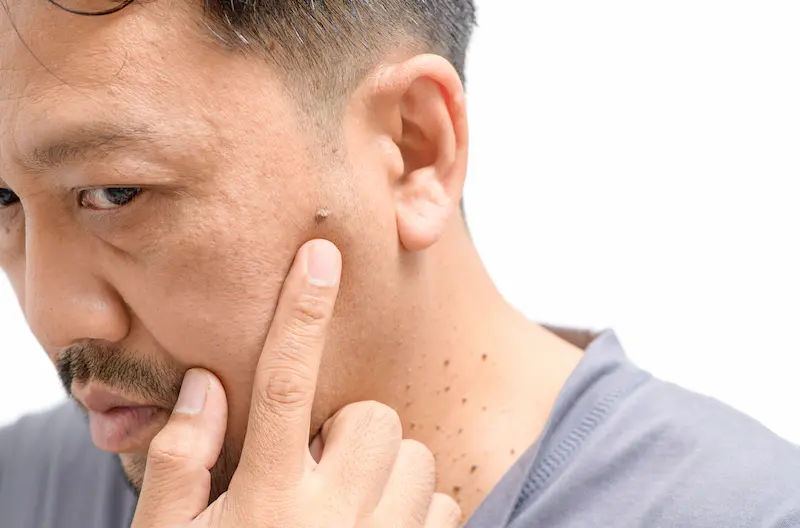Types of Skin Diseases
Discover common skin diseases, their causes, symptoms, and treatments. Learn about acne, eczema, psoriasis, infections, autoimmune conditions, and skin cancer. Prioritise skin health for overall well-being with expert advice and timely care.

Written by
Last updated on 13th Jan, 2026
The skin, the largest organ of the human body, serves as a barrier and regulates vital functions while reflecting overall health. It protects the body against external elements, maintains temperature, and synthesises vitamin D.
Healthy skin is crucial for well-being, as it acts as the first line of defence against infections, making prompt treatment of skin conditions essential to prevent complications. Keep reading to know the different types of skin diseases and their treatment approaches.
Common Types of Skin Diseases
Below are a few common skin diseases affecting individuals worldwide:
1. Acne
It is a common skin disorder, particularly in adolescents. It is caused by clogged hair follicles from excess sebum, dead skin cells, and bacteria.
Hormonal changes, stress, and diet can all contribute to worsening the condition of acne. Treatment options include topical agents such as benzoyl peroxide, retinoids, and oral agents in severe cases.
Eczema, or atopic dermatitis, causes itchy, inflamed patches of skin. Management consists of regular moisturisation, avoiding known triggers, and prescription treatments such as corticosteroids or calcineurin inhibitors.
2. Psoriasis
It is a chronic inflammatory disease triggered by an autoimmune response that leads to an accelerated proliferation of skin cells.
Psoriasis commonly affects areas such as the elbows, knees, and scalp. Flare-ups can be triggered by factors like stress or infections.
Treatment ranges from topical therapies and phototherapy (light therapy) for mild to moderate cases to systemic medications for more severe conditions.
3. Rosacea
It is a chronic condition that affects the face, resulting in redness, visible blood vessels, and sometimes acne-like bumps.
Triggers are spicy foods, alcohol and sun exposure.
Management includes avoiding triggers, topical or oral medications and laser treatments for moderate to severe symptoms.
Infectious Skin Diseases
More severe skin conditions caused by infections include:
1. Bacterial Infections: Impetigo and Cellulitis
Impetigo, a highly contagious bacterial infection, is usually characterised by red sores that become ruptured and then develop honey-coloured crusts.
Cellulitis, by contrast, is a deeper skin infection causing redness, swelling and pain. It can benefit from antibiotics in a timely manner to prevent complications in either condition.
2. Viral Infections: Warts and Herpes
Developing from the human papillomavirus (HPV), these are small, rough growths that most often resolve on their own but can be treated by cryotherapy or salicylic acid.
Herpes simplex virus (HSV) infections cause cold sores or genital herpes, treated with antiviral medications to decrease symptoms and recurrence.
3. Fungal Infections: Athlete's Foot and Ringworm
These infections thrive in warm, damp environments, leading to conditions like athlete’s foot, which causes itching and peeling of the skin.
Ringworms are circular, red, scaly patches on the skin. Both conditions respond well to over-the-counter antifungal creams or prescription treatments.
Autoimmune Skin Diseases
Certain autoimmune conditions, in which the body’s immune system attacks its own healthy tissues, can also cause skin diseases.
Lupus: It is a systemic autoimmune disease that can involve skin manifestations, including a butterfly-shaped rash on the face. Avoiding sun exposure and taking drugs like corticosteroids or antimalarials can be important to keeping symptoms at bay.
Vitiligo: This condition causes the loss of skin pigment, which creates white patches. It develops when melanocytes, the pigment-producing cells, are destroyed. Treatments include topical steroids, light therapy, and camouflage techniques for skin tone.
Consult Top Experts for Your Conditions
Skin Cancer Awareness
Unusual growth of cells may lead to skin cancer. Melanoma, the most aggressive variety, frequently grows within moles or pigmented areas.
Basal cell carcinoma is more common and slowly growing. Early detection via regular checks of the skin and seeking medical attention promptly are crucial.
Increased sun exposure, light skin, and a history of sunburn increases the risk of skin cancer.
Protective strategies include the use of sunscreen, taking shelter in the shade, and avoiding tanning beds. Regular dermatological examination aids in early diagnosis.
Allergic Reactions on Skin
Apart from infections and diseases, the skin can also suffer from allergic reactions, such as:
Contact Dermatitis: It develops due to direct contact with allergens or irritants, resulting in red, itchy rashes. Identifying and avoiding triggers is crucial for management, while topical corticosteroids and antihistamines can help alleviate symptoms during flare-ups. Prompt treatment is essential to prevent complications and maintain skin health.
Urticaria: Hives or urticaria is a common allergic reaction that appears as raised, itchy welts and can be triggered by infections or stress. Antihistamines are the first line of treatment, with more severe cases needing prescription medications.
Dermatological Diagnostic Techniques
A skin biopsy is a procedure performed to obtain a sample of skin tissue for laboratory examination. It is most often done to diagnose skin cancer, rashes or unexplained lesions. Patch testing is for allergens that are causing contact dermatitis. Microdoses of potential allergens are placed on top of the skin, but reactions are only observed after 48 hours.
Treatment Options for Skin Diseases
Topical treatments, including corticosteroids, antibiotics, and antifungal creams, are first-line therapies for many skin conditions. They work by applying directly to the affected area for localised treatment.
For severe or widespread skin diseases, systemic treatments are administered drugs taken orally or by injection.
Immunosuppressants for autoimmune conditions and biologics for psoriasis are examples.
A consistent skincare routine, combined with lifestyle changes such as a balanced diet and effective stress management, is essential for maintaining healthy skin and preventing diseases.
Psychological Impact of Skin Diseases
Skin diseases often impact self-esteem and mental health, with visible conditions like acne or vitiligo frequently leading to anxiety, depression, or social withdrawal. Managing the emotional effects of these conditions can be easier through support groups and open communication with healthcare providers, friends, and family.
Conclusion
Skin diseases encompass various conditions that affect the skin, differing in causative factors, signs, symptoms, and management strategies. Understanding these conditions facilitates early intervention and effective management, as timely diagnosis is crucial to avoid complications and improve outcomes.
Regular skin check-ups and prompt consultation with a dermatologist for any unusual skin changes are essential for maintaining skin health and overall well-being.
Consult Top Dermatologist
Consult Top Experts for Your Conditions

Dr. S Madhuri
Dermatologist
10 Years • MBBS, MD. DVL, DNB, Fellow (Dermatosurgery & Lasers)
Secunderabad
Apollo Hospitals Secunderabad, Secunderabad
(450+ Patients)

Dr. Madhab Datta
Dermatologist
7 Years • MBBS, MD (DVL)
Kolkata
Dr. Madhab Datta's Clinic, Kolkata

Dr. Soumya Kanti Datta
Dermatologist
5 Years • MBBS, MD ( VD & L)
Kolkata
Foresight Clinic & Diagnostic, Kolkata
(175+ Patients)

Dr. Kaushiki Hajra
Dermatologist
5 Years • MBBS, MD Dermatology, Venerology & Leprosy
Kolkata
MCR SUPER SPECIALITY POLY CLINIC & PATHOLOGY, Kolkata

Dr. Priyankar Misra
Dermatologist
11 Years • MBBS, MD Dermatology , Venereology & Leprosy
Kolkata
MCR SUPER SPECIALITY POLY CLINIC & PATHOLOGY, Kolkata
Consult Top Dermatologist

Dr. S Madhuri
Dermatologist
10 Years • MBBS, MD. DVL, DNB, Fellow (Dermatosurgery & Lasers)
Secunderabad
Apollo Hospitals Secunderabad, Secunderabad
(450+ Patients)

Dr. Madhab Datta
Dermatologist
7 Years • MBBS, MD (DVL)
Kolkata
Dr. Madhab Datta's Clinic, Kolkata

Dr. Soumya Kanti Datta
Dermatologist
5 Years • MBBS, MD ( VD & L)
Kolkata
Foresight Clinic & Diagnostic, Kolkata
(175+ Patients)

Dr. Kaushiki Hajra
Dermatologist
5 Years • MBBS, MD Dermatology, Venerology & Leprosy
Kolkata
MCR SUPER SPECIALITY POLY CLINIC & PATHOLOGY, Kolkata

Dr. Priyankar Misra
Dermatologist
11 Years • MBBS, MD Dermatology , Venereology & Leprosy
Kolkata
MCR SUPER SPECIALITY POLY CLINIC & PATHOLOGY, Kolkata

